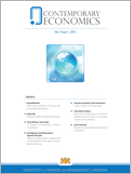Income Security and the Perception of Disability Risk
Income Security and the Perception of Disability Risk
Author(s): Marcin Kawiński, Tadeusz SzumliczSubject(s): Socio-Economic Research
Published by: Akademia Ekonomiczno-Humanistyczna w Warszawie
Keywords: Income; security; disability; risk perception;
Summary/Abstract: The concept of income security is almost 80 years old but its implementation, nevertheless, poses a serious social security problem. How is this problem seen today by those most concerned, family households? What is the perception of contingencies listed in the International Labour Organization’s (ILO) recommendation? Human responses to risk (behaviour under risk) depend primarily on a perception of risk and disability risk is not different in this respect. It is a major social risk, a part of the list of social risks, and tends to be critical due to financialization and liabilities. This paper aims to find determinants for differences in the perception of disability risk in Poland. The research covers particular determinants and employs qualitative and quantitative methods to analyse such determinants. The qualitative study suggests that the risk of disability is not a primary consideration. The perception of that risk seems to be diverse. Pending liabilities are perceived as arising primarily due to unemployment rather than the lack of fitness for work. An analysis of quantitative data shows statistical importance of chosen determinants (gender, experience regarding disability within family, age, the level of education, and self-estimation of financial situation). However, their significance is limited. Age and education level seem to be most prospective. Young and highly educated people tend to perceive disability risk as relatively low. These are also the people who face the most significant financial consequences of disability.
Journal: Contemporary Economics
- Issue Year: 15/2021
- Issue No: 4
- Page Range: 499-510
- Page Count: 12
- Language: English

